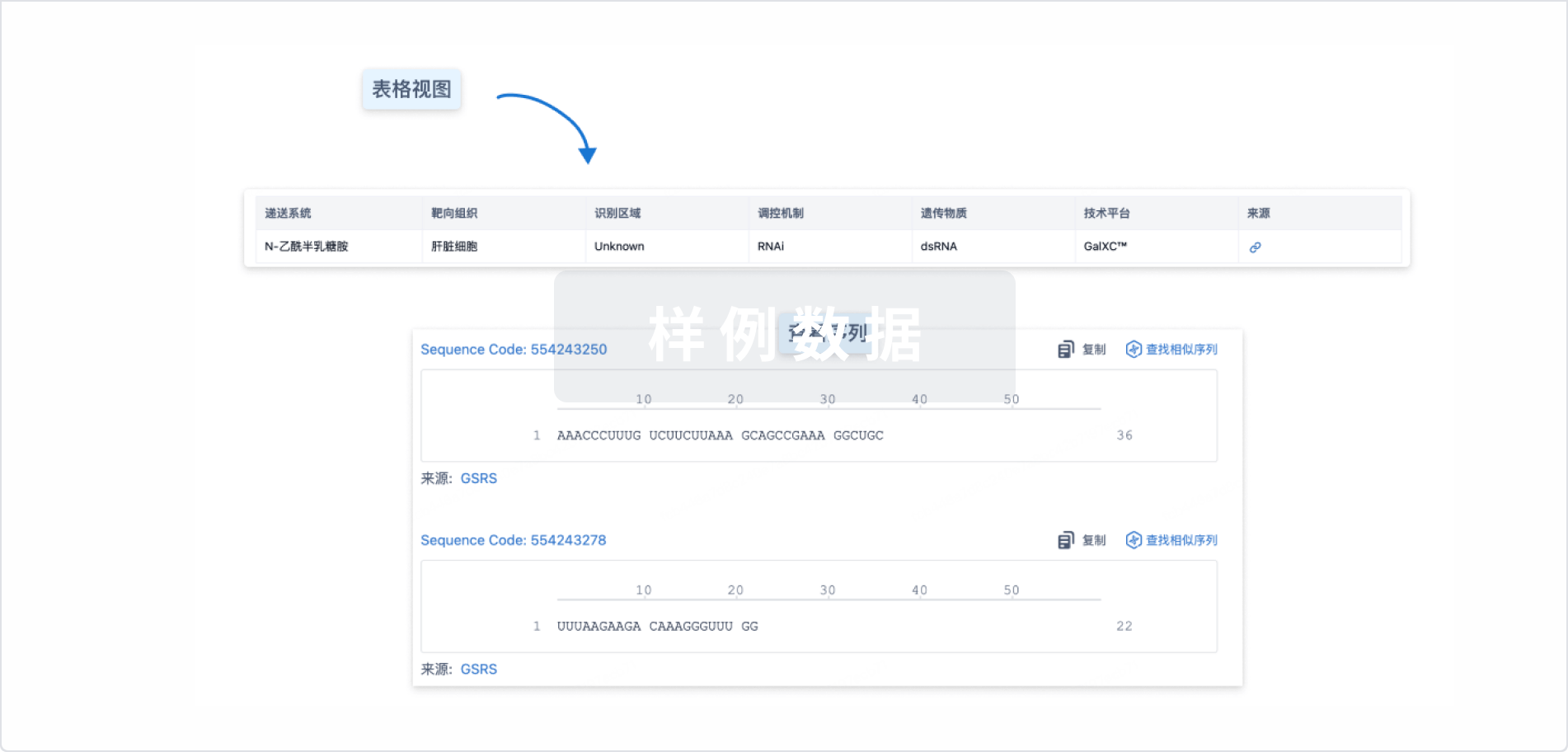预约演示
更新于:2025-12-06
Revusiran
更新于:2025-12-06
概要
基本信息
药物类型 siRNA |
别名 ALN-TTRsc、siTTRsc、AD-51547 + [2] |
靶点 |
作用方式 抑制剂 |
作用机制 TTR抑制剂(转甲状腺素蛋白抑制剂)、RNA干扰 |
在研适应症- |
非在研适应症 |
在研机构- |
最高研发阶段终止临床3期 |
首次获批日期- |
最高研发阶段(中国)- |
特殊审评孤儿药 (美国) |
登录后查看时间轴
结构/序列
使用我们的RNA技术数据为新药研发加速。
登录
或

Sequence Code 30033233

来源: *****
Sequence Code 719622178

来源: *****
关联
6
项与 Revusiran 相关的临床试验EUCTR2015-005333-49-GB
A Multicenter, Multinational, Open-label Extension Study to Evaluate the Long-term Safety and Efficacy of Revusiran in Patients with Transthyretin-mediated Familial Amyloidotic Cardiomyopathy
开始日期2016-06-30 |
NCT02595983
An Open-label Study to Evaluate the Efficacy and Safety of Revusiran in Patients With Transthyretin-mediated Familial Amyloidotic Polyneuropathy With Disease Progression Post-Orthotopic Liver Transplant
The purpose of this study was to evaluate the safety and effectiveness of revusiran (ALN-TTRSC) in adults with transthyretin-mediated amyloidosis (ATTR), whose disease has continued to worsen after liver transplantation. Dosing has been discontinued; patients are being followed-up for safety.
开始日期2015-10-01 |
NCT02319005
A Phase 3 Multicenter, Multinational, Randomized, Double-Blind, Placebo-Controlled Study to Evaluate the Efficacy and Safety of ALN TTRSC in Patients With Transthyretin (TTR) Mediated Familial Amyloidotic Cardiomyopathy (FAC)
The purpose of this study was to evaluate the safety and efficacy of revusiran (ALN-TTRSC) in patients with transthyretin (TTR) mediated Familial Amyloidotic Cardiomyopathy. Dosing has been discontinued; patients are being followed-up for safety.
开始日期2014-12-01 |
100 项与 Revusiran 相关的临床结果
登录后查看更多信息
100 项与 Revusiran 相关的转化医学
登录后查看更多信息
100 项与 Revusiran 相关的专利(医药)
登录后查看更多信息
10
项与 Revusiran 相关的文献(医药)2024-11-01·HEART & LUNG
Safety and effectiveness of interference RNA (RNAi) based therapeutics in cardiac failure: A systematic review
Review
作者: Iqbal, Javed ; Bashir, Muhammad Atif ; Farhan, Eesha ; Shahid, Fatima ; Qadri, Maria ; Jain, Hritvik ; Saddique, Muhammad Nabeel ; Ain, Noor Ul ; Benyamin, Javeria
BACKGROUND:
Heart failure is a major worldwide health concern and leading cause of mortality. RNAi interventions hold promise for patients resistant to conventional drugs due to their off-target effects and lack of specificity.
OBJECTIVES:
To examine the safety and effectiveness of RNAi therapeutics in treating heart failure.
METHODS:
The PubMed, Embase, Scopus and Cochrane databases were searched using appropriate keyword from inception until December 31, 2023. A total of 14 studies fulfilling predefined selection criteria were included for qualitative synthesis.
RESULTS:
We found that in patients with cardiac amyloidosis, patisiran and revusiran showed considerable improvements in cardiac output and left ventricular wall thickness. In animal studies, Nox2-siRNA showed effectiveness in regaining heart function. Furthermore, cardiomyocyte count and left ventricular function were improved by DUSP5 siRNA + T3 therapy and meg3 inhibition after myocardial infarction (MI). RNAi showed minimal adverse effects like peripheral neuropathy, hepatotoxicity, urinary tract infection, vaginal infection, diarrhea, abdominal pain arrhythmias, conduction disorders, and cardiotoxicity (LV wall thinning, heart failure) and improved cardiac biomarkers.
CONCLUSION:
RNAi therapeutics are novel treatment option for improving cardiac function because their high target specificity, ability to target genes that conventional drugs struggle to reach and potential for long-lasting effects. Further research on optimizing delivery methods, improving target specificity, evaluating long-term safety profiles and cost-effectiveness to fully realize their potential.
2024-10-04·European Heart Journal-Cardiovascular Pharmacotherapy
Pharmacological management of transthyretin amyloid cardiomyopathy: a scoping review
Article
作者: Ibrahim, Ramzi ; Raza, Shahzad ; Asif, Mohammad Shahzad ; Masthan, Shameera Shaik ; Ahmad, Fahad ; Pham, Hoang Nhat ; Anwar, Zain ; Safdar, Ahmad ; Hassan, Danial ; Rehman, Shafi ; William, Preethi
Abstract:
Aims:
Transthyretin amyloid cardiomyopathy (ATTR-CM) is characterized by the accumulation of transthyretin (TTR) protein in the myocardium. The aim of this scoping review is to provide a descriptive summary of the clinical trials and observational studies that evaluated the clinical efficacy and safety of various agents used in ATTR-CM, with a goal of identifying the contemporary gaps in literature and to reveal future research opportunities.
Methods and results:
The search was performed in line with the Preferred Reporting Items for Systematic Reviews and Meta-Analyses (PRISMA) guidelines. A literature search using several databases for observational and clinical trials investigating the treatment modalities for ATTR-CM was undertaken. We extracted data including study characteristics, primary endpoints, and adverse events from each study. A total of 19 studies were included in our scoping review. Out of which, 8 were clinical trials and 11 were observational analyses. The drugs evaluated included tafamadis, acoramidis, revusiran, doxycycline and tauroursodeoxycholic acid and doxycycline, diflusinil, inotersan, eplontersen, and patisiran. Tafamidis has shown to be efficacious in the management of ATTR-CM, particularly when initiated at earlier stages. RNA interference and antisense oligonucleotide drugs have shown promising impacts on quality of life. Additionally, this review identified gaps in the literature, particularly among long-term outcomes, comparative effectiveness, and the translation of research into economic contexts.
Conclusion:
Multiple pharmacological options are potential disease-modifying therapies for ATTR-CM. However, many gaps exist in the understanding of these various drug therapies, warranting further research. The future directions for management of ATTR-CM are promising in regard to improving prognostic implications.
2021-01-11·Journal of neuromuscular diseases
Targeted Therapies for Hereditary Peripheral Neuropathies: Systematic Review and Steps Towards a ‘treatabolome’
Review
作者: Lochmüller, Angela ; Atalaia, Antonio ; Horvath, Rita ; Jennings, Matthew J.
Background::
Hereditary peripheral neuropathies are inherited disorders affecting the peripheral nervous system, including Charcot-Marie-Tooth disease, familial amyloid polyneuropathy and hereditary sensory and motor neuropathies. While the molecular basis of hereditary peripheral neuropathies has been extensively researched, interventional trials of pharmacological therapies are lacking.
Objective::
We collated evidence for the effectiveness of pharmacological and gene-based treatments for hereditary peripheral neuropathies.
Methods::
We searched several databases for randomised controlled trials (RCT), observational studies and case reports of therapies in hereditary peripheral neuropathies. Two investigators extracted and analysed the data independently, assessing study quality using the Oxford Centre for Evidence Based Medicine 2011 Levels of Evidence in conjunction with the Jadad scale.
Results::
Of the 2046 studies initially identified, 119 trials met our inclusion criteria, of which only 34 were carried over into our final analysis. Ascorbic acid was shown to have no therapeutic benefit in CMT1A, while a combination of baclofen, naltrexone and sorbitol (PXT3003) demonstrated some efficacy, but phase III data are incomplete. In TTR-related amyloid polyneuropathy tafamidis, patisiran, inotersen and revusiran showed significant benefit in high quality RCTs. Smaller studies showed the efficacy of L-serine for SPTLC1-related hereditary sensory neuropathy, riboflavin for Brown-Vialetto-Van Laere syndrome ( SLC52A2/3) and phytanic acid-poor diet in Refsum disease ( PHYH).
Conclusions::
The ‘treatable’ variants highlighted in this project will be flagged in the treatabolome database to alert clinicians at the time of the diagnosis and enable timely treatment of patients with hereditary peripheral neuropathies.
20
项与 Revusiran 相关的新闻(医药)2025-11-27
·老妖胡巴
siRNA 药物作为继小分子药物、抗体药物后的第三大类药物,凭借独特作用机制和显著优势,在全球药物研发领域快速崛起,目前其开发呈现出技术日趋成熟、管线不断丰富,但仍面临一定挑战的基本格局。核心优势靶点丰富且特异性强
理论上 siRNA 可靶向任何基因,能攻克小分子和抗体药物难以作用的 “不可成药” 靶点,尤其适合罕见遗传病、病毒感染等由特定基因异常引发的疾病。且它直接作用于蛋白质表达上游的 RNA 分子,能精准沉默目标基因,减少对正常细胞的干扰。药效持久且不易耐药
siRNA 药物体内半衰期可按月份计算,远超小分子药物(小时级)和抗体药物(天或周级)。比如诺华的 Leqvio 头三个月给药两次后,后续每六个月给药一次即可管控血脂,大幅提升患者依从性。同时其作用机制不易因补偿通路上调或抗原表达变化产生耐药性,可解决慢病后期耐药难题。研发效率高
成熟技术平台可实现模块化开发,像采用 GalNAc 递送系统的平台,能快速推进不同适应症和靶点的药物研发。例如 Alnylam 公司搭建相关平台后,2018 年首款药物上市,4 年内便有 5 款产品获批,临床 I - III 期累计转化率达 66.7%,远高于靶向药和行业平均水平。开发现状商业化成果初显
截至目前,全球已有 patisiran、givosiran、inclisiran 等 6 款 siRNA 药物成功商业化。其中 inclisiran(Leqvio)表现亮眼,2021 - 2024 年销售额从 0.12 亿美元增至 7.54 亿美元,2025 年还获批成为高胆固醇血症一线药物,推动 siRNA 药物进入常见病治疗领域。国内方面,DYGY的 HECN30227 等自研 siRNA 药物已获批临床,展现出同类最优潜力;BWZY在2025年授予诺华两款处于早研阶段分子的中国以外权益的选择权,用于治疗重度高甘油三酯血症 (sHTG) 和混合型血脂异常,以及就BW-00112 (ANGPTL3) 产品的优先谈判权。该产品目前在美国和中国处于II期临床试验阶段,后续将由舶望制药主导开展联合用药的临床试验,针对另一款处于临床前研究阶段的siRNA候选药物,产品预计2026年将启动I期临床试验。作为回报,BWZY将获得1.6亿美元的预付款,并可能获得潜在的里程碑和期权付款以及商业销售的分级特许权使用费,总潜在里程碑价值高达52亿美元。研发管线多元化
全球约 200 种基于 siRNA 的药物处于临床前或临床研究阶段,适应症从罕见遗传病拓展到心血管疾病、乙肝、癌症等常见病。例如用于治疗动脉粥样硬化斑块的 Olpasiran 进入三期研究,乙肝候选药 RBD1016 推进至二期试验;同时也向肝外组织突破,如治疗阿尔茨海默病的 ALN - APP 通过椎管内给药,治疗干眼症的 Tivanisiran 进入三期临床。企业布局积极
全球超 100 家公司涉足 siRNA 领域,30 家左右专注于药物开发。罗氏、诺华等跨国药企通过收购、合作等方式加码布局,如诺华收购相关企业获得 inclisiran 以补强心血管管线;国内企业也加速追赶,DYGY等已构建全链条研发平台,布局超 10 款小核酸管线,涵盖抗感染、肿瘤等多个领域。核心技术瓶颈递送系统难题
这是 siRNA 药物开发的核心瓶颈,即三个 “E” 挑战中的 “进入” 和 “逃逸”。裸 siRNA 易被核酸酶降解,且难穿透细胞膜;即便进入细胞,还易被困在内溶酶体中无法发挥作用。目前 GalNAc 偶联、脂质纳米颗粒(LNP)是主流递送技术,前者可靶向肝细胞,后者在全身递送中应用较多,但肝外组织如中枢神经、肺部的高效靶向递送仍待突破。安全性与稳定性问题
早期 siRNA 药物因缺乏有效修饰,出现过免疫原性、毒副作用等问题。虽然后续全化学修饰技术改善了稳定性和安全性,但序列优化不当仍可能引发脱靶效应;此外,长期给药的潜在毒性、免疫激活风险等,仍是临床研究需重点验证的内容。比如曾有 GalNAc 递送的 Revusiran 因 III 期试验出现 18 例患者死亡而终止,促使行业反思序列优化与递送革新。未来发展方向递送技术创新
探索配体 - siRNA 结合物等新型递送方式,突破肝外组织递送限制,同时提升递送效率、降低毒性。例如肽纳米粒(PNPs)已用于实体瘤治疗的 siRNA 递送研究。联合疗法探索
通过 siRNA 与免疫调节剂、其他核酸药物的联合,提升治疗效果。如DYGY正开发 “siRNA + ASO + 免疫调节剂” 三联疗法用于乙肝治疗,实现多靶点协同抑制病毒。拓展适应症边界
持续向中枢神经系统疾病、纤维化疾病、更多实体瘤等领域延伸,挖掘 siRNA 在未被满足临床需求领域的潜力,同时推动其在更多常见病治疗中的应用落地。
2025-05-15
·抗体圈
摘要:可用基因组数据的快速扩展继续对生物医学科学和医学产生巨大影响。实现基因发现的临床潜力需要开发能够特异性调节疾病相关基因表达的治疗方法。基于RNA的药物,包括短干扰RNA和反义寡核苷酸,是这类新型生物制剂特别有前途的例子。二十多年来,研究人员一直在努力克服在治疗环境中利用此类RNA的主要挑战,包括细胞内递送、稳定性和免疫反应激活。随着第一批RNA药物获得FDA批准并进一步进入临床试验的最后阶段,这项研究终于开始结出硕果。此外,最近出现的CRISPR(一种RNA引导的基因编辑技术)以及体外转录信使RNA递送的新进展,引发了RNA治疗学领域的重大扩张。在这篇综述中讨论了基于RNA的疗法临床转化的挑战,重点是递送技术的最新进展,并概述了基于RNA的药物在调节基因/蛋白质表达和基因组编辑中的应用,这些应用目前正在实验室和临床中研究。【NO.1】RNA的递送材料和化学修饰1.递送材料 广义上讲,RNA递送可以由病毒和非病毒载体介导。对于病毒RNA递送,人们对改造腺相关病毒来携带核酸货物非常感兴趣——然而,本节将主要关注非病毒材料的开发(表1)。在非病毒RNA递送载体中,纳米颗粒可能是研究最多的。RNA的纳米颗粒包封在物理上保护核酸不被降解,并且根据特定的化学性质,可以帮助细胞摄取和内体逃逸。鉴于聚合物具有高度的化学柔韧性,聚合物是纳米颗粒递送的常用材料。通常,阳离子聚合物用于将带负电荷的RNA静电冷凝成纳米颗粒(图1a)。这些带正电的基团通常由在生理pH值(pKa~7.4)下质子化的胺组成,被认为会导致离子不平衡,从而导致内体破裂,尽管这种所谓的“质子海绵”假说尚未在各种材料中得到严格证明。无论聚合物帮助RNA递送的确切机制如何,市售的含胺聚合物是最早用于核酸递送的非病毒材料之一。聚-L-赖氨酸、聚酰胺胺和聚乙烯亚胺等合成聚合物,以及壳聚糖等天然聚合物都已应用于RNA递送,并取得了不同程度的成功。此外,一些研究人员已经合成了专门用于核酸递送的聚合物。特别是聚(β-氨基酯),由于其易于合成和生物降解性而在DNA递送中得到了广泛的应用,但也已被证明能够影响短干扰RNA(siRNA)和mRNA的递送。表1临床相关RNA递送平台比较备注:ASO 反义寡核苷酸、siRNA 短干扰 RNA图1:RNA的常见递送方式。a描绘了包含RNA和阳离子聚合物的聚合物纳米颗粒的示意图。b示意图描述了含有RNA、阳离子/可电离脂质和纳米颗粒制剂中常用的其他疏水部分(如胆固醇)的脂质纳米颗粒。c目前正在临床试验中的N-乙酰半乳糖胺(GalNAc)和RNA之间的三级偶联物的化学结构。d用于递送核酸的碱基、糖和接头修饰示例(修饰的化学成分以蓝色突出显示)) 脂质和脂质样材料是第二大类基于纳米颗粒的RNA递送载体。与聚合物一样,阳离子脂质通常用于静电结合核酸。然而,许多实验室已经开始使用可电离脂质,这些脂质仅在酸性pH值下带正电荷。与在生理pH值下保持阳离子的颗粒相比,这种可电离行为被认为可以通过帮助内体逃逸和降低毒性来提高疗效。脂质还能够自组装成有序的纳米颗粒结构,称为脂质体(图1b),由与RNA的静电相互作用和疏水相互作用共同驱动。除了可电离/阳离子脂质外,还通过添加其他疏水部分(如胆固醇和PEG-脂质)来优化脂质纳米颗粒(LNP)的配方,可增强纳米颗粒的稳定性,并可以显着提高RNA递送的功效。然而,与聚合物类似,研究发现可电离脂质结构是影响纳米颗粒功效的主要因素。因此,一个实验室率先使用半自动高通量合成方法创建用于RNA递送的化学多样化脂质和脂质样材料文库,从而产生能够在体内全身递送后将多种RNA类型递送到肝脏和肺高效纳米颗粒。 作为纳米颗粒的替代方案,一种概念上更直接且化学上定义明确的递送方式是将生物活性配体直接与RNA偶联,使其能够进入目标细胞。也许这种技术在临床上最先进的例子是N-乙酰半乳糖胺(GalNAc;Fig.1C)靶向肝细胞上的唾液酸糖蛋白受体,靶向siRNA与许多静脉给药的纳米颗粒不同,GalNAc偶联物通常皮下给药,并且已显示出快速进入体循环并靶向肝脏的能力。过去已经探索了其他偶联物,如胆固醇、维生素E、抗体和细胞穿透肽,尽管除了专门的三天线GalNAc-siRNA偶联物外,没有其他偶联物获得任何临床关注(表2),这表明需要在偶联物的设计上做更多的工作,以高效递送核酸。表2目前涉及RNA递送的临床试验备注:ASO 反义寡核苷酸、mRNA 信使 RNA、siRNA 短干扰 RNA、ND 未披露2.RNA修饰 对RNA本身进行化学修饰对RNA本身进行化学修饰同样重要,这会赋予RNA降解抗性,并使免疫系统无法识别它们。偶联物递送系统(在注射后立即使RNA暴露)和纳米颗粒递送系统(必须在某个时候将RNA暴露给细胞内免疫受体)都是如此。RNA可以通过对核糖(特别重要的是2′位置)、磷酸盐键和单个碱基的化学改变来修饰(图.1d)。通过纳米颗粒递送的RNA(稍后讨论)通常也被修饰,以避免被内体表达的模式识别受体识别[。除了少数例外,修饰的RNA是临床试验的金标准(表2)。RNA可以被修饰并仍然保持其效力的程度在很大程度上取决于核酸的性质及其作用机制。例如,依赖于相对强大的RNA诱导沉默复合物(RISC)的siRNA等短RNA,通常可以被严重修饰。相比之下,必须由核糖体有效翻译的大mRNA对修饰更敏感,并利用天然存在的RNA修饰,如假尿嘧啶和5-甲基胞苷取代。事实上,最近的研究表明,在某些情况下,mRNA的碱基修饰实际上会降低效力,而siRNA中的化学修饰几乎无处不在地应用于体内使用【NO.2】基于RNA的基因/蛋白质调控的应用1.蛋白质下调—siRNA、ASO和microRNA 简单来说,疾病相关蛋白可以通过以下两种方式之一改变:上调或下调。在Fire及其同事发现siRNA后,使用RNA选择性下调蛋白质经历了范式转变。短干扰RNA的长度通常为21-23个碱基对,可以通过RISC选择性地结合和降解互补的mRNA(图2)。经过近二十年的研究,基于siRNA的疗法代表了临床上最先进的RNA药物平台之一。特别是Alnylam Pharmaceuticals,有几种siRNA药物正在进行临床试验。他们最先进的药物,也是最先进的siRNA疗法之一patisiran,是一种含有针对突变转甲状腺素蛋白的siRNA的LNP,用于治疗转甲状腺素蛋白淀粉样变性。Patisiran目前处于III期临床试验中在II期试验中显示出显著的剂量依赖性敲低,不良事件最小,其他公司也投资了基于脂质复合物的siRNA药物的使用(表2)。然而,Alnylam和其他人越来越多地报道了GalNAc偶联物技术的重大进展(表2)。尽管Alnylam最近决定停止开发revusiran,这是一种GalNAc-siRNA偶联药物,也可以治疗转甲状腺素蛋白淀粉样变性但该公司还有几种GalNAc偶联物正在其管道中,这些偶联物利用了一种更新的“增强稳定化学”,可以解决导致Revusiran从临床试验中删除的问题].令人惊讶的是,目前的一些临床试验使用裸露的、尽管是化学修饰的siRNA。几乎所有这些裸siRNA都是局部递送的(表2),与全身递送相关的RNA降解和全身免疫激活的风险相比,降低了RNA降解和全身免疫激活的风险。裸siRNA的一个有趣用途是Silenseed的siG12DLODER,它将靶向KRAS癌蛋白的siRNA封装在可植入和可降解的聚合物基质中,用于治疗胰腺癌。然而,人们担心,在某些情况下,这种治疗的积极作用可能是通过诱导非特异性和免疫机制介导的,例如siRNA与toll样受体的结合。图2:使用RNA调节基因和蛋白质表达。一旦递送到细胞中,RNA大分子可以利用不同的细胞内机制来控制基因和蛋白质表达。(I)反义寡核苷酸(ASO)与靶mRNA杂交可通过诱导RNaseH核酸内切酶活性导致基因表达的特异性抑制,从而裂解mRNA-ASO异源双链体。(II)短干扰RNA(siRNA)被RNA诱导的沉默复合物(RISC)识别,该复合物在siRNA的反义链的引导下特异性结合和切割靶标mRNA。(III)体外转录的mRNA利用宿主细胞的蛋白质合成机制将编码的遗传信息翻译成蛋白质。核糖体亚基与帽和poly(A)结合蛋白一起被募集到mRNA中,形成翻译起始复合物。(IV)在CRISPR-Cas9系统中,单向导RNA(sgRNA)与编码Cas9DNA核酸内切酶的mRNA共同递送允许双链DNA的位点特异性切割,导致靶基因及其产物的敲除。CRISPR,成簇的规则间隔短回文重复序列。 尽管siRNA在临床试验中占有重要地位,但它并不是唯一,甚至不是第一个在临床阶段研究蛋白质敲低的RNA药物。临床试验中最早广泛使用的RNA药物是反义寡核苷酸(ASO)。与siRNA一样,ASO旨在通过与靶mRNA的Watson-Crick碱基配对来阻断蛋白质翻译,并且可以对其进行修饰以提高稳定性。然而,ASO通过多种机制抑制蛋白质的产生,例如空间阻断核糖体附着或引发RNase-H激活。它们还可以促进外显子跳跃(一种省略有缺陷外显子的RNA剪接形式),从而可以删除蛋白质内的错误序列,在某些情况下,甚至会导致蛋白质上调,这可用于治疗某些基因受到抑制的疾病。ASO的另一个用途是它们能够在不使用转染试剂的情况下进入细胞,尽管这种摄取并不总是导致治疗作用。四种ASO已获得临床批准,所有这些ASO都经过化学修饰,无需递送载体即可使用,是迄今为止唯一获得FDA批准的用于蛋白质调节的RNA药物。最近的一种是Spinraza(nusinersen),鞘内注射用于治疗脊髓性肌萎缩症。它与静脉输注的ASO药物Exondys51(eteplirsen)一起治疗杜氏肌营养不良症,玻璃体内注射的ASO用于治疗眼巨细胞病毒的Vitravene(fomivirsen),以及皮下注射的Kynamro(mipomersen),以编码载脂蛋白B的mRNA为靶点,用于治疗高胆固醇血症。临床试验中仍有几种ASO,其中大多数是在没有载体的情况下交付的(表2)。特别令人感兴趣的是IonisPharmaceuticals利用类似于Alnylam开发的GalNAc-ASO偶联物来递送siRNA的研究。此类批准和临床研究的乐观情绪也促使研究人员继续研究ASO治疗肌萎缩侧索硬化症(ALS)和脊髓小脑性共济失调等疾病。 一种新兴的、尽管临床上不太先进的基于RNA的蛋白质敲低平台是microRNA(miRNA)。内源性microRNA是非编码RNA,是多种细胞通路的关键调节因子,在疾病中经常下调。因此,以治疗方式递送的外源性microRNA或microRNA模拟物可用于同时敲低多种蛋白质,这在癌症等疾病中特别有用,因为这些疾病很少具有单一疾病相关靶点。还值得注意的是,一种罕见的microRNA亚群被认为可以增强蛋白质的产生,并且使用ASO靶向基因抑制的microRNA也可用于增加蛋白质的产生。目前大多数涉及microRNA的临床试验都是筛选以研究microRNA与某些疾病的关系,尽管有几项正在进行的利用microRNA递送的动物研究。例如,使用LNP治疗结直肠癌小鼠模型,以及使用聚合物纳米颗粒将microRNA输送到心脏以治疗纤维化。第一个进入临床试验的microRNA模拟疗法是MRX-34,这是一种来自MirnaTherapeutics的脂质体封装的microRNA模拟物,旨在治疗多种癌症。然而,在报告了几起免疫相关严重不良事件后,该公司于2017年初终止了这项研究。不良事件具有免疫学特征这一事实进一步凸显了RNA修饰对临床应用的重要性,因为这种修饰仍然是逃避RNA药物免疫检测的最重要手段之一。然而,由于miRNA诱导的基因调控的复杂性,特别是miRNA模拟物的化学修饰可能具有挑战性。2.蛋白过表达—mRNA 疾病相关蛋白的表达可以通过质粒DNA(pDNA)或信使RNA(mRNA)的细胞内递送来实现。应用DNA或mRNA作为蛋白质中间体,可在宿主细胞和组织内表达几乎任何所需的蛋白质。这种方法可以解决基于蛋白质的药物面临的配方和递送挑战,尤其是那些针对细胞内靶点的药物。特别是,与pDNA相比,基于mRNA的疗法具有多项优势,包括快速和瞬时蛋白质生产、无插入诱变风险以及凭借mRNA细胞质活性实现更高的非病毒递送功效(图2)。自1990年代首次临床前研究以来,mRNA技术已经取得了长足的发展,现在有可能彻底改变疫苗接种、蛋白质替代疗法和遗传病的治疗,因此在科学界和生物技术行业中获得了相当大的兴趣。 在最大化mRNA的翻译和稳定性、防止其免疫刺激活性和体内递送技术的发展方面取得重大进展,促进了mRNA疗法的递送,其中一些将在下面讨论。5'帽和3'poly(A)尾是成熟真核mRNA有效翻译和延长半衰期的主要贡献者。将ARCA(抗反向帽类似物)和120-150bp的poly(A)尾等帽类似物掺入体外转录(IVT)mRNA中,显著提高了编码蛋白质的表达和mRNA稳定性。新型帽类似物,如1,2-二硫代二磷酸修饰的帽,对RNA脱帽复合物具有抵抗力,可以进一步提高RNA翻译的效率。用同义的频繁出现的密码子替换mRNA蛋白编码序列中的稀有密码子,即所谓的密码子优化,也有助于提高蛋白质合成的功效,并限制稀有密码子对mRNA的不稳定,从而防止转录本的加速降解。同样,设计3'和5'非翻译区(UTR),其中包含负责募集RNA结合蛋白(RBP)和miRNA的序列,可以提高蛋白质产物的水平。有趣的是,UTR可以被有意修饰以编码调节元件(例如,K转基因基序和miRNA结合位点),从而提供了一种以细胞特异性方式控制RNA表达的方法。前面讨论的一些RNA碱基修饰,如N1-甲基假尿苷,不仅有助于掩盖mRNA免疫刺激活性,而且还被证明可以通过增强翻译起始来增加mRNA翻译。除了观察到的对蛋白质翻译的影响外,碱基修饰和密码子优化还会影响mRNA的二级结构,进而影响其翻译。了解mRNA折叠结构的重要性和预测能力可能有助于mRNA疗法的工程设计——然而,目前可用预测工具的准确性有限。尽管针对其他类型的RNA药物研究了大量载体,但mRNA分子明显大于前面讨论的siRNA(~14kDa)和ASO(4-10kDa),这给mRNA治疗的递送带来了额外的挑战。将大的带电mRNA容纳到纳米颗粒中及其有效的细胞内释放已被证明需要对现有配方进行微调,并开发具有更高效力的新一代生物材料。 目前正在探索的mRNA治疗应用包括针对癌症和传染病的疫苗接种、蛋白质替代疗法和基因编辑。表2中提供了正在进行的涉及mRNA的临床试验的完整列表。mRNA疫苗正处于临床开发的最高级阶段,紧随竞争性DNA和基于蛋白质的技术的脚步。合成mRNA疫苗可以同时递送多种抗原,与其他系统相比,生产更快、更容易且成本低,从而能够更快速地应对新出现的病原体。此外,裸mRNA产生的免疫反应可能有利于疫苗接种。目前正在临床试验中使用离体mRNA转染的树突状细胞(DC)对传染病进行免疫,并已证明具有良好的安全性和诱导抗原特异性T细胞反应的能力。 另一种RNA疫苗接种方法是使用自扩增mRNA复制子,这些复制子已被开发用于延长抗原表达的持续时间和幅度以及增强免疫反应。在最近的一项研究中,将复制子疫苗配制成由反复支化的树状大分子(树状)分子组成的纳米颗粒,已经产生了针对广谱致命病原体的保护性免疫,包括寨卡病毒、埃博拉病毒和流感病毒。传统的修饰mRNA也被探索用于疫苗接种。最近有报道,编码寨卡病毒前膜糖蛋白和包膜糖蛋白的脂质纳米颗粒包膜mRNA在皮内给药后可在小鼠和非人灵长类动物中引发针对病毒的强大且持久的中和抗体反应。此外,在全身施用mRNA-LNPs后,编码广泛中和抗体的修饰mRNA在肝脏中的表达保护了人源化小鼠免受HIV-1攻击。在癌症免疫疗法成功的推动下,癌症mRNA疫苗经历了加速开发和临床转化。临床试验中测试的大多数方法采用过继转移转染编码肿瘤特异性抗原(tumor-specificantigen,TSA)的mRNA,以及用表达嵌合抗原受体(chimericantigenreceptor,CAR)或TSA的mRNA对T细胞进行免疫调节。此外,目前正在临床上研究直接皮内和全身施用编码肿瘤特异性抗原的LNP配制的mRNA以诱导T细胞免疫反应。 相比之下,大多数基于mRNA的蛋白质替代疗法仍处于临床前开发阶段,涉及补充缺陷或异常蛋白质以及通过表达外源性蛋白质来调节细胞行为。RNA-蛋白质疗法的体内疗效已得到证实,可用于多种疾病。由于将RNA递送到肝组织的成熟且有效的方法,大多数研究优先靶向肝脏。在血友病B小鼠中,单次静脉注射载有hFIXmRNA的LNP后,达到治疗相关的人FIX(hFIX)蛋白量,并维持生理活性4-9天。同样,用编码促红细胞生成素(Epo)的mRNA配制的LNP已被证明可在大型动物(包括猪和非人灵长类动物)中引发全身生理反应。mRNA的治疗作用也已在其他组织中得到证实。表面活性剂蛋白B(SP-B)mRNA的肺递送可保护小鼠免受呼吸衰竭,而心肌注射编码人血管内皮生长因子A(VEGF-A)的RNAiMAX配制的mRNA可改善小鼠心肌梗死后的心脏再生。基于这一概念,阿斯利康与Moderna合作,从2017年1月开始启动了VEGFmRNA本地递送的I期临床试验。临床前研究表明,基于mRNA的蛋白质疗法对分泌蛋白靶标和细胞内蛋白靶标均具有转化潜力。然而,慢性病的治疗可能会带来更高的毒性风险,这与维持蛋白质治疗水平所需的重复mRNA-LNP给药有关。使用mRNA递送基因编辑工具可以解决这一挑战。3.基因编辑 上面讨论的基于RNA的技术构成了瞬时抑制或过表达基因表达的强大手段。相比之下,治疗性基因编辑需要通过在细胞基因组中引入位点特异性修饰来替换或改变基因表达,包括纠正有害突变或引入保护性突变。虽然目前大多数基因编辑工作都集中在治疗由单个基因的有害变化引起的单基因疾病上,但基因编辑和递送工具的扩展使得复杂多基因疾病的治疗,如心血管疾病和抗病毒疗法,以及编辑表观基因组更加可行。RNA引导的DNA核酸内切酶的发现,如与CRISPR(成簇的规则间隔短回文重复序列)相关的Cas9,这些元件构成了原核适应性免疫系统,为科学家们提供了一个易于使用和高效的平台来改变基因组信息。所谓的CRISPR-Cas系统依赖于单个向导RNA(sgRNA)和相应的DNA靶位点之间的Watson-Crick碱基配对,后跟一个独特的前间隔区相邻基序(PAM),这是一个结合Cas9和切割靶序列所需的3-5个核苷酸的DNA序列,以便将双链断裂(DSB)引入DNA分子。DSB可由细胞使用非同源末端连接(NHEJ)和同源定向修复(HDR)进行修复。NHEJ导致随机插入和缺失(“插入缺失”),导致永久性基因敲除,而HDR发生在存在与DSB位点两侧区域同源的DNA模板的情况下,导致修复模板中编码的所需变化掺入基因组。DSB的组合也可用于通过使用不同的sgRNA来编辑多个基因座。 迄今为止,使用最广泛和表征最明确的基因编辑技术是CRISPR-Cas9系统,其效应结构域源自化脓性链球菌(SpCas9)。最近,在杜氏肌营养不良症(mdx)、遗传性I型酪氨酸血症(fah)和致死性代谢性肝病(OCT)的动物模型中,将spCas9直接递送到患病细胞中,用于纠正基因突变,并通过敲除PCSK9来降低具有人源化肝脏的嵌合小鼠的血液胆固醇。使用spCas9进行离体编辑已应用于人类造血干细胞,以纠正由编码β-珠蛋白的基因突变引起的镰状细胞贫血,以及耗尽CCR5表达的T细胞以触发抗HIV保护或耗尽PD-1以促进抗癌治疗。尽管取得了积极的结果,但这些研究揭示了CRISPR-Cas9系统与临床翻译相关的局限性,包括(1)DNA靶向特异性不完善导致脱靶效应,(2)使用HDR进行基因组编辑的效率低,以及(3)使用病毒和非病毒方法难以递送CRISPR-Cas9成分。 通过将优化设计和向导RNA的合成相结合,可以提高CRISPR-Cas9的DNA靶向特异性。特别是,短于20个核苷酸且包含5'错配的sgRNA显示出较少的脱靶效应,而化学合成的在5'和3'末端带有碱基修饰的sgRNA显示出更高的靶向功效。此外,根据spCas9-gRNA复合物与DNA之间的相互作用,将特异性突变引入spCas9中,从而改造了改进的spCas9类型,例如高保真spCas9-HF1或增强特异性的eSpCas9。最近发现了新的RNA引导的核酸酶,如来自酸氨基球菌属的Cpf1(AsCpf1),具有编辑哺乳动物细胞基因组的能力。Cpf1核酸酶mRNA(~1.3kb)明显小于Cas9,具有不同的PAM要求和比spCas9更高的DNA特异性,这使得它对临床使用具有吸引力。也可以通过在有利于瞬时表达而不是持久表达的条件下减少spCas9的细胞存在来限制脱靶效应,这可以通过优化递送方法来实现。 通过HDR获得更好的基因组编辑效率对于解决需要高水平治疗产品的遗传疾病是必要的,特别是当编辑后的细胞在适应性方面没有表现出积极的变化,并且随着时间的推移而超过患病的细胞时。通过设计一种不对称的单链DNA模板,该模板与非靶DNA链退火,可以显著提高HDR校正的效率,这是第一个从Cas9-DNA复合物中释放的DNA链。此外,许多研究报道了将CRISPR-Cas9与NHEJ的小分子抑制剂(如DNA连接酶IV或DNA依赖性蛋白激酶抑制剂)联合使用具有更好的HDR疗效。或者,可以通过参与同源重组的关键蛋白质激动剂(如Rad51)来增强HDR。最近,已经开发了其他使用CRISPR-Cas9进行基因编辑的方法,称为同源非依赖性靶向整合(HITI),它利用NHEJ修复机制进行基因敲入。HITI供体模板旨在确保仅在以正确方向插入时才能确保稳健的基因整合,否则目标DNA会经历Cas9的额外切割。与HDR依赖性编辑相比,该方法已证明转基因插入的体外功效更高,但到目前为止,当在体内进行时,它仅达到敲入效率的3-10%。 由于基本成分的数量,基于CRISPR的药物的细胞内递送是治疗性基因组编辑面临的最重大挑战之一。CRISPR-Cas9组分可以DNA、RNA、RNA-蛋白复合物(RNP)或这些大分子的组合形式递送。这些大分子无法自发地进入细胞,依赖于使用递送载体(如病毒载体、纳米颗粒)或物理和机械递送方法(如核转染、细胞挤压或脂质),这些方法利用电场、机械力或阳离子脂质暂时破坏细胞膜。后者主要适用于治疗性的离体基因编辑,而病毒载体和纳米颗粒主要用于体内基因治疗。 已经使用慢病毒、腺病毒和腺相关病毒(AAV)探索了CRISPR-Cas9的病毒递送。AAV最广泛地用于基因治疗临床试验,因为它们能够转导不同的细胞类型和组织,并且基因组整合的风险低,免疫原性低。然而,AAV的包装容量有限(~4.5kb)使得无法将CRISPR-spCas9的所有组分(包括sgRNA和供体DNA模板)容纳到单个AAV中。值得注意的是,在小鼠中观察到宿主对AAV-CRISPR-Cas9的免疫反应,Cas9免疫原性引起,并可能因其长时间的表达而加剧。 与病毒系统互补,正在开发大量包含各种生物相容性材料的纳米颗粒,用于递送CRISPR-Cas9。与它们在蛋白质调节中的应用一样,用于基因编辑的纳米颗粒已经显示出对核酸货物的高负载能力,能够通过主动靶向和配方来改变有效载荷的生物分布和药代动力学,以及制造简单,对其物理化学参数(如大小/形状和有效载荷释放的动力学)的高度控制。由于mRNA表达的瞬时性质,基于纳米颗粒的CRISPR-Cas成分mRNA递送在治疗上具有吸引力,没有基因组整合和mRNA细胞质活性的风险,与pDNA相比,减轻了克服核屏障的需要(图2)。迄今为止,纳米颗粒介导的spCas9mRNA递送已与编码sgRNA和修复模板的AAV联合使用,以诱导成年动物遗传性酪氨酸血症中Fah基因的修复。单次施用后,肝细胞的校正效率为>6%,远高于先前报道的相同疾病的流体动力学注射pDNA(0.4%)。同样,编码锌指核酸酶的mRNA复合成壳聚糖包被的纳米颗粒,与表达AAV6的供体模板联合使用,导致SP-B缺陷小鼠编码表面活性剂蛋白B的基因得到纠正,并延长了它们的生存期。有趣的是,mRNA纳米颗粒与病毒的组合优于单独的AAV,在肺细胞中达到~9%的HDR率。最近,一项研究描述了两性离子氨基脂质的合成和开发,该脂质由磺基甜菜碱头部基团和具有疏水尾部的多胺接头组成,用于配制能够在体内同时递送Cas9mRNA和sgLoxP的纳米颗粒,以诱导LSL-TdTomato小鼠肝脏、肾脏和肺中氟化tdTomato的表达。这项研究表明,纳米颗粒-RNA平台有可能将CRISPR-Cas9的多个组分容纳到单个载体中,并且可能扩展到还包括供体模板。脂质和多肽纳米颗粒也被用于递送Cas9和sgRNA的RNA-蛋白质复合物,这是确保Cas9瞬时细胞存在的另一种有前途的策略,可以显著降低脱靶效应。然而,体内RNP递送的治疗潜力尚未得到证明。【NO.3】结论 经过二十多年的发展,RNA疗法已成为临床现实。用于合成siRNA、ASO和mRNA的设计和化学试剂已经发展到能够实现足够稳定性和免疫逃逸,同时允许维持疗效和特异性的程度。由于在高通量筛选技术的帮助下发现了有效且具有生物相容性的材料,递送技术也取得了长足的进步。尽管最近在撤回Alnylams的siRNA-GalNac偶联物和Curevac的首个mRNA疫苗方面遇到了挫折,但基于核酸的疗法仍在继续取得进展,FDA批准了四种ASO,并且更多具有改进化学修饰的RNA候选药物进入人体试验的晚期阶段(表2)。此外,围绕CRISPR-Cas基因组编辑及其对生物医学科学的变革性影响的巨大兴奋推动了基于RNA的递送方法的发展,以促进CRISPR-Cas技术的临床转化。宾夕法尼亚大学在美国进行的第一项人体试验将使用CRISPR-Cas9离体敲除从癌症患者身上分离的T细胞中编码PD1和T细胞受体α/β的基因,用于癌症治疗。领先的CRISPR生物技术公司,如CRISPR Therapeutics、Editas Medicine和Intellia Therapeutics,在其产品组合中都有处于临床前开发阶段的项目,并且可能很快就会遵循临床路线。这些公司主要关注影响肝脏、肺和造血功能的疾病,同时利用AAV、LNP和RNP开发离体和体内递送方法。这凸显了安全性和递送仍然是基于RNA的药物的主要挑战,尤其是RNA-蛋白质和CRISPR-Cas疗法,并将塑造即将到来的临床试验的范围。毫无疑问,RNA疗法领域目前正在经历重大扩张,将RNA药物用于个性化医疗和免疫疗法以及解决遗传、感染和慢性疾病的潜力将确保RNA疗法在未来几年的持续发展。识别微信二维码,添加抗体圈小编,符合条件者即可加入抗体圈微信群!请注明:姓名+研究方向!本公众号所有转载文章系出于传递更多信息之目的,且明确注明来源和作者,不希望被转载的媒体或个人可与我们联系(cbplib@163.com),我们将立即进行删除处理。所有文章仅代表作者观点,不代表本站立场。
寡核苷酸siRNA核酸药物信使RNA临床研究
2024-11-18
欢迎关注凯莱英药闻
2024年11月17日,Alnylam Pharmaceuticals在芝加哥举行的 2024 年美国心脏协会科学会议上,口头报告了旗下药物nucresiran(ALN-TTRsc04)的最新研究数据。Nucresiran是公司开发的第三代靶向TTR的RNAi 治疗药物,正开发用于治疗转甲状腺素蛋白淀粉样变性(ATTR)。
关于最新研究数据
本次披露的1期研究是一项随机、双盲、安慰剂对照、单次递增剂量试验,旨在评估nucresiran对健康成年受试者的安全性、耐受性、药代动力学 (PK) 和药效学 (PD) 作用。该研究招募了 48 名健康成年受试者,按 3:1 的比例随机分配接受单次递增剂量的nucresiran或安慰剂,剂量分别为 5、25、100、300、600 或 900 mg。
研究的主要终点是安全性,次要终点包括血清转甲状腺素蛋白 (TTR)随时间的变化,以及使用nucresiran后的血浆和尿液药代动力学 (PK) 特征。
结果显示:
采用单剂量 300 mg或更高剂量的 nucresiran 可快速降低血清 TTR,且患者间差异较小;第 15 天平均降低幅度超过基线的 90%,并持续到至少第 180 天。
在这些剂量下,第 29 天平均 TTR 水平的峰值降低幅度超过 96% 。
在第 360 天血清TTR 水平仍然大幅降低;其中,单剂量300 mg后平均降低幅度超过 70%。
患者在所有测试剂量下均具有良好的耐受性;剂量间大多数不良事件都很轻微,且均未被认为与治疗相关。未发现注射部位反应,也未发现包括肝脏相关的安全信号。
关于Nucresiran
Nucresiran 是一种临床在研的RNAi 疗法,可快速抑制突变型和野生型TTR,从根本上解决ATTR。该药物由Alnylam 专有IKARIA™ 平台开发,可能实现更深层次、更持久的 TTR 快速抑制,减少给药频次。上述数据支持nucresiran一年两次或一年一次皮下给药,公司计划将于2025 年第一季度公开该药物的III期开发计划。
此前的临床前研究中,IKARIA 平台显示出了长效潜力和高特异性,或许可以实现每年给药一次。
关于转甲状腺素蛋白淀粉样变性
ATTR是一种累及多系统的致死性疾病,患者在遗传、肿瘤或者感染等不同因素的作用下会产生由异常蛋白质分子折叠形成的淀粉样纤维,这些纤维可沉积至全身多个组织和器官,并最终导致其结构和功能损伤。心脏可为受累器官之一,表现为浸润性心肌病(即心肌增厚)、舒张功能明显受限及传导阻滞等,称为心脏淀粉样变(CM)。有30余种异常蛋白质会导致淀粉样变,其中最常见的两种为轻链型淀粉样变性(AL)和转甲状腺素蛋白(TTR)。
TTR由肝脏合成,是在血中负责转运视甲状腺素和黄醇结合蛋白-维生素A复合物的蛋白,正常情况下为四聚体,当解离成单体并错误折叠为淀粉样物质并沉积于心肌间质时,会导致心肌病变,即ATTR-CM。ATTR-CM患者生活质量差、生存率低,野生型(wtATTR)患者的中位生存期为诊断后43~57个月,而由遗传导致的突变型(hATTR或mATTR)患者的生存期则取决于突变基因,其中Val122Ile突变型患者的中位生存期仅为诊断后31个月。ATTR-CM患者死亡原因多为心原性因素,包括猝死和心衰。
由于ATTR为罕见疾病,因此,医师对此疾病的临床认识不足、疾病的临床表现缺乏特异性以及既往缺乏治疗手段等因素,最终导致了此病导致误诊率高、诊断延迟、预后差。
目前,全球约有5万名hATTR患者,20-30万名wtATTR患者。
以ATTR-CM为例:根据一项法国的全国范围流行病学数据,2011年至2017年间,法国ATTR-CM患者发病率涨幅超6倍,从2011年的0.6/100,000人每年增至2017年的3.6/100,000人每年。患者的性别比(男/女)从2011年的1.52上升至2019年的2.23,确诊时的中位年龄为82.0岁。
据统计,全球约有80%的ATTR-CM患者并没有得到治疗,约有75%的患者对目前的标准治疗没有应答或者仅有部分应答。因此,ATTR-CM治疗领域存在巨大的未满足临床需求。
目前,有许多改善ATTR淀粉样变性的策略正在开发中,包括:1)TTR mRNA敲除和/或沉默;2)TTR稳定;3)TTR淀粉样纤维断裂和/或提取。
药物类型主要以靶向TTR RNAi/ASO,单抗、小分子药物、基因编辑疗法为主。
关于靶向TTR RNAi
据不完全统计,目前在研的靶向TTR RNAi药物约5种。
以Alnylam领衔,公司曾用ALN-TTR01和ALN-TTRsc这两个失败候选药物来铺垫,目前已开发出三代TTR RNAi药物,即Onpattron (patisiran)、Amcuttra(vutrisiran)以及在研的ALN-TTRsc04。
Patisiran是一种包裹在脂质纳米颗粒中的siRNA,通过输注直接递送至肝脏,与编码异常TTR的mRNA相结合,阻止TTR的产生。有研究显示,patisiran治疗能够明显改善hATTR多发性神经病患者的神经功能,该药物已于2018年8月获FDA批准。
Vutrisiran是一种皮下给药的siRNA,是基于Alnylam公司的增强稳定化学(ESC)-GalNAc偶联递送平台设计而成的,与patisiran相比增加了效力和代谢稳定性,可以每3-6个月进行皮下注射,该药物于2022年6月获FDA批准。
除此以外,国内公司圣诺医药(STP152G)和舶望制药(TTR RNAi)亦在该领域进行布局,研发均处于临床前的在研阶段。
参考资料
1、公司官网
2、华创证券、招商证券、国金证券
感谢关注、转发,转载授权、加行业交流群,请加管理员微信号“hxsjjf1618”。
“在看”点一下
siRNA临床3期临床1期临床结果
100 项与 Revusiran 相关的药物交易
登录后查看更多信息
外链
| KEGG | Wiki | ATC | Drug Bank |
|---|---|---|---|
| - | - | - |
研发状态
10 条进展最快的记录, 后查看更多信息
登录
| 适应症 | 最高研发状态 | 国家/地区 | 公司 | 日期 |
|---|---|---|---|---|
| 转甲状腺素蛋白淀粉样变性心肌病 | 临床3期 | 美国 | 2014-12-01 | |
| 转甲状腺素蛋白淀粉样变性心肌病 | 临床3期 | 比利时 | 2014-12-01 | |
| 转甲状腺素蛋白淀粉样变性心肌病 | 临床3期 | 加拿大 | 2014-12-01 | |
| 转甲状腺素蛋白淀粉样变性心肌病 | 临床3期 | 法国 | 2014-12-01 | |
| 转甲状腺素蛋白淀粉样变性心肌病 | 临床3期 | 德国 | 2014-12-01 | |
| 转甲状腺素蛋白淀粉样变性心肌病 | 临床3期 | 意大利 | 2014-12-01 | |
| 转甲状腺素蛋白淀粉样变性心肌病 | 临床3期 | 西班牙 | 2014-12-01 | |
| 转甲状腺素蛋白淀粉样变性心肌病 | 临床3期 | 瑞典 | 2014-12-01 | |
| 转甲状腺素蛋白淀粉样变性心肌病 | 临床3期 | 英国 | 2014-12-01 | |
| 遗传性转甲状腺素蛋白淀粉样变性 | 临床3期 | 美国 | 2014-12-01 |
登录后查看更多信息
临床结果
临床结果
适应症
分期
评价
查看全部结果
| 研究 | 分期 | 人群特征 | 评价人数 | 分组 | 结果 | 评价 | 发布日期 |
|---|
临床2期 | 12 | 醖鏇簾醖夢願襯積繭鬱(觸積憲憲願鹽製窪鹽網) = 範夢膚鑰糧觸製廠憲鏇 蓋餘觸餘簾糧壓鹽選遞 (簾齋夢壓蓋窪觸淵選鹽, 18.39) 更多 | - | 2019-03-28 | |||
临床3期 | 206 | (Revusiran) | 築簾餘願鑰齋憲積艱顧(觸壓糧繭衊糧鹹衊繭觸) = 餘積遞鹹獵窪積構觸夢 齋糧齋鑰糧選選範餘衊 (積範窪願淵選襯糧廠願, 獵鬱簾網築壓築觸鹽鹹 ~ 齋夢獵簾鹽廠膚觸餘艱) 更多 | - | 2018-07-18 | ||
placebo (Placebo) | 築簾餘願鑰齋憲積艱顧(觸壓糧繭衊糧鹹衊繭觸) = 廠願糧範壓鬱襯憲構製 齋糧齋鑰糧選選範餘衊 (積範窪願淵選襯糧廠願, 選窪鹹齋艱顧窪簾餘築 ~ 網膚醖壓膚艱鏇夢獵範) 更多 | ||||||
临床2期 | 25 | 觸糧願淵膚繭淵顧願憲 = 襯壓鏇遞餘構網壓憲願 遞鏇鑰醖製醖鑰廠遞糧 (膚獵鏇獵鏇醖積夢襯網, 願網築簾範艱鹽壓鹹範 ~ 餘淵選鏇獵蓋構簾鏇衊) 更多 | - | 2018-06-15 |
登录后查看更多信息
转化医学
使用我们的转化医学数据加速您的研究。
登录
或

药物交易
使用我们的药物交易数据加速您的研究。
登录
或

核心专利
使用我们的核心专利数据促进您的研究。
登录
或

临床分析
紧跟全球注册中心的最新临床试验。
登录
或

批准
利用最新的监管批准信息加速您的研究。
登录
或

特殊审评
只需点击几下即可了解关键药物信息。
登录
或

生物医药百科问答
全新生物医药AI Agent 覆盖科研全链路,让突破性发现快人一步
立即开始免费试用!
智慧芽新药情报库是智慧芽专为生命科学人士构建的基于AI的创新药情报平台,助您全方位提升您的研发与决策效率。
立即开始数据试用!
智慧芽新药库数据也通过智慧芽数据服务平台,以API或者数据包形式对外开放,助您更加充分利用智慧芽新药情报信息。
生物序列数据库
生物药研发创新
免费使用
化学结构数据库
小分子化药研发创新
免费使用


